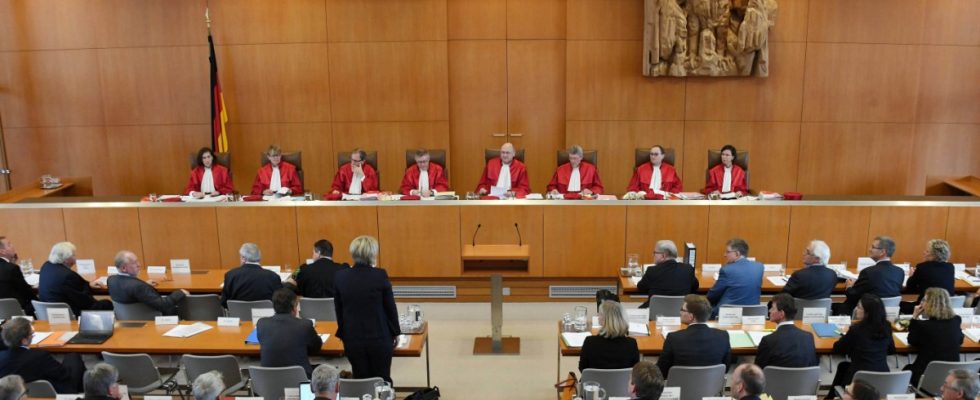It looked like a slammed door. A good four weeks ago, CDU leader Friedrich Merz canceled talks about strengthening the Federal Constitutional Court. Constitutional lawyers had called for such a reform in order to protect the important institution from enemies of the constitution in times of radicalization. Representatives of the government parties proposed a change to the Basic Law. This would require a two-thirds majority, including the consent of the Union.
There were discussions, at first. Then suddenly the Union said: there was no longer any need. Now representatives of the CDU and CSU have sat down at the table again with Justice Minister Marco Buschmann (FDP). An agreement has not yet been reached. But coalition circles said on Thursday that the matter was on the right track.
“It must be possible to organize the necessary majorities in order to anchor the independence of the Federal Constitutional Court more firmly in the Basic Law,” Buschmann wrote on Platform X on Thursday. Germany’s highest court has proven to be a “supporting pillar of our liberal democracy.” Buschmann had already signaled in January that he could imagine better legal protection for the important institution in Karlsruhe, also to prevent constitutional crises like those in Poland. “I am therefore very pleased that the Union is returning to the negotiating table,” he wrote now. It’s about overall political responsibility as “serious democrats.”
If the AfD gets stronger, what will happen to the Constitutional Court?
No more bickering between the government and the opposition, please – that’s how Buschmann’s comment should be understood. Since the AfD, which is partly right-wing extremist, has become the strongest force in surveys in some federal states, not only constitutional lawyers are asking themselves what will actually become of the independence of the Federal Constitutional Court if those who despise democracy continue to gain ground, including in the Bundestag.
The Federal Constitutional Court Act, which regulates important details about the appointment and term of office of constitutional judges, can be changed with a simple majority in the Bundestag. The Basic Law, in turn, only regulates the tasks of the Federal Constitutional Court in Article 93. Article 94 provides information about the filling of judicial positions by the Bundestag and Bundesrat, although only in an extremely brief paragraph. This could change now.
On Wednesday, Justice Minister Buschmann presented a working draft for a reform to specialist politicians from the traffic light factions and the Union. It is intended to reorganize and anchor the structure of the Federal Constitutional Court in the Basic Law. Length of document: twelve pages. The following day, people involved heard that nothing had been decided on this. There is now great concern that an indiscretion could bring the project down again. On Thursday the first one was Rheinische Post quoted from Buschmann’s working draft, which is also available to the SZ.
The elements that shape the Federal Constitutional Court as a constitutional body should “become much more visible” in the Basic Law, says Buschmann’s paper. The sentence should be enshrined in Article 93: “The Federal Constitutional Court is an independent federal court vis-à-vis all other constitutional bodies.”
Inflate the Basic Law with details? Not everyone thinks this is a good idea
But Buschmann also wants to anchor the internal nature of the court and the conditions for exercising its office in the Basic Law, in Article 94. In the future, the Basic Law and no longer ordinary law should determine the number of senates and members of the court. “The same applies to their term of office and to the exclusion of their re-election,” it continues. According to current law, constitutional judges can hold office for twelve years, and only once. Re-election is not possible. This is intended to prevent members of the court from allowing themselves to be put under political pressure or bending over their heads in order to be appointed for another term.
So far, the Federal Constitutional Court Act regulates such details – changeable with a simple majority in the Bundestag. Buschmann and representatives of the traffic light now want to incorporate the regulations into the Basic Law, at least in part. This means that a deviation from current practice could only be implemented with a two-thirds majority. This is also intended to prevent the arbitrary dismissal of politically unpopular judges or blockades by opponents of the constitution when filling positions.
However, not all right-wing politicians in the Bundestag think it is a good idea to inflate the Basic Law with so many details. In the 75 years since the Basic Law came into force, Germany has done well with its comparatively lean constitution, it was said weeks ago in the Union. The constitution should not be overburdened without necessity. Apparently some people see it the same way. Parts of Buschmann’s extensive catalog of planned regulations could still be removed.
The Greens are also leaning towards a rather slim change to the Basic Law. Others, on the other hand, argue that too many regulations that can only be changed with a two-thirds majority could also narrow the scope of Democrats. The German Association of Judges welcomed the progress in the negotiations on Thursday. However, Buschmann’s suggestions are only a first step. “Political initiatives are now needed in the federal states to better protect the judiciary from party-political attacks and to strengthen it as a bulwark of democracy,” said Federal Managing Director Sven Rebehn. The talks will continue on April 8th.

